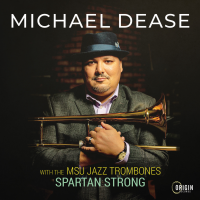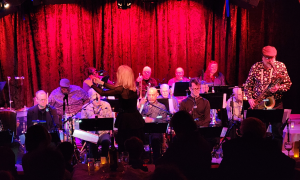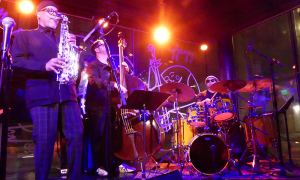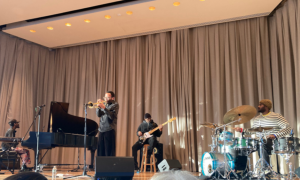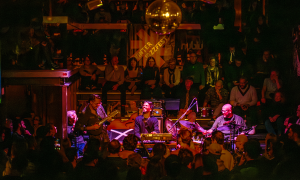Home » Jazz Articles » Live Review » Charles McPherson Quintet at Jazz Alley
Charles McPherson Quintet at Jazz Alley
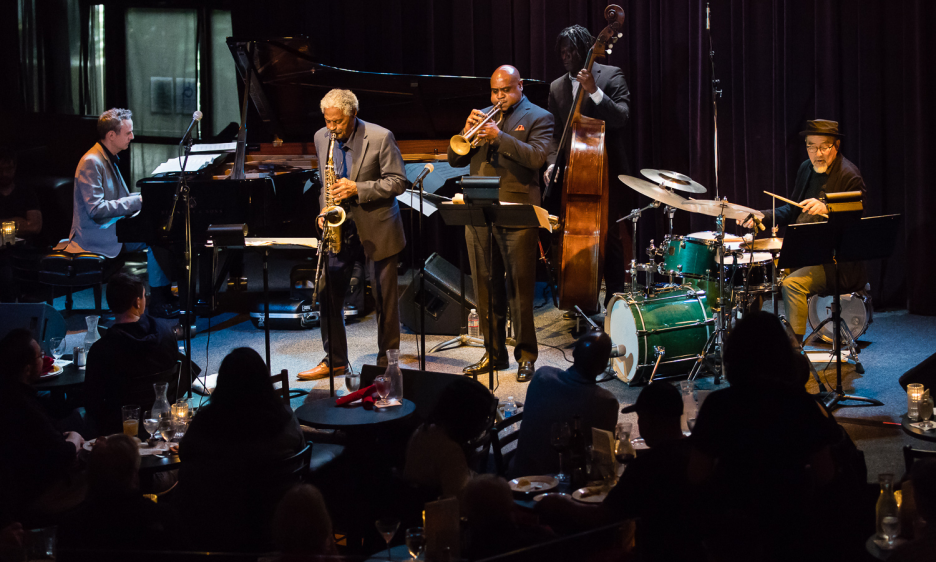
Courtesy Lisa Hagen Glynn
To be a McPherson fan over the past 50 years is to be an observer of jazz music of not only the past half century, but the lineage of the music directly back to Charlie Parker and the true pioneers of bebop.
Jazz Alley
Seattle, WA
June 13, 2023
To be fortunate enough to see an artist of the caliber of alto saxophonist/master composer Charles McPherson perform live is a blessing, to be sure. Jazz fans of any age can be recipients of this privilege, though fans who have accumulated several decades of age can, perhaps, appreciate the opportunity the most. To be a McPherson fan over the past 50 years is to be an observer of jazz music of not only the past half century, but the lineage of the music directly back to Charlie Parker, and the true pioneers of bebop.
McPherson in the present at 83 years of age is still a master of his instrument, and one of the most compelling composers of the post-bop era. His performance at Seattle's venerable Jazz Alley featured music from Jazz Dance Suites (Chazz Mack, 2019), his collaboration with the San Diego Ballet, and a selection of bebop gems. The current tour featured a well-chosen band that included trumpeter Terell Stafford, whose powerful blues style served as the perfect foil. Pianist Jeb Patton added dynamic charge to the harmony and rhythm aspects of the band, while contributing fine soloing and a solo piano original. The masterful bassist Marcus Shelby and veteran Los Angeles drummer Akira Tana on this opening night, took a few minutes to find each other rhythmically, but once in sync, served as the accelerant of the 90-minute set.
Opening with the pre-bop classic, "I"ll Remember April," the quintet struggled to find its footing, with the leader making small adjustments in his setup. "I used to be faster," quipped McPherson, finally settling into a groove that would be relentless going forward. Ever the stylist, Stafford had a lot to do with pulling the band together and advancing forward, swinging hard. Partnering with McPherson, the two played in and out of tunes switching off melody and harmony parts. In between, the dynamic twosome and the band at large issued a rigorous adventure into the mother tongue of bebop.
The second selection of the evening was a distinct change of gears: McPherson's "Song of the Sphinx." The melody seems like an old friend somehow, perhaps in its composition containing a myriad of perceived familiar sounds. The piece had a mystic feel, accentuated by Stafford's cascading runs and strong, melodic ties to the core melody. McPherson took the melody off-track a bit, displaying his penchant for approaching melodic dynamics with both tenderness and unbridled intensity. The master always seems to find a destination that is not just technically brilliant, but somehow finds the inescapable beauty of a tune.
Of course, it should surprise nobody that McPherson is uncommonly melodic and swinging in both his playing and composing. Growing up under the tutelage of Barry Harris, who lived just a few blocks from McPherson's childhood home in Detroit, and standing side by side with Charles Mingus over 14 years will contribute strongly to that. The fact that he has not only found and groomed the ever-elusive original voice is confounded only by the fact that he continues to probe unexplored space at this point of his career. The concept of age is lost in the music, as it should be. He does this while maintaining a deep taproot into the bebop tradition, and to Bird himself.
McPherson's ageless splendor was revealed whether playing his upbeat modern dance piece, "The Wedding Song," or bearing down on "Cherokee," the ultimate bebop cautionary tale. While the front line received most of the evening's accolades, Patton shared his brilliance on both pieces assumably, with great humility and conviction.
The emotional peak of the performance may have taken place during its quietest moments. Dipping into the classic ballad, "Old Folks," trumpeter Stafford went deep and blue, rendering a fine interpretation of the melody with an emotional attachment that seemed genuine. On McPherson's "Nightfall," the altoist joined Stafford, alternating between the melody and harmony parts of the tune, played loosely and interpretatively.
McPherson's original compositions, it must be said, were the most impressive element of the set. Sounding fresh, yet classic, the melodies draw positive comparisons to any jazz standard. With musicians of exceptional facility and overall sound performing them, the tunes and the artist who composed them, came to vivid life. While matching his historic genius on saxophone may be hard for McPherson to come to terms with on a nightly basis, he appears to be in his absolute prime as a composer. His playing on this particular evening was sharp, adventurous and tonally rich. He did the little things you notice about a great bandleader as well, spontaneously directing his charges.
The quintet ended the evening playing a blues, which is right up Stafford's alley. The trumpeter has a lot of Chicago in his playing, one of the cities where he has spent considerable time. Between his run through the changes, and those of McPherson, the band gave its audience access to the deep blue roots of the music, pulling them close for the finale.
This performance in a singular sense was not earth shattering and explosively unforgettable. It was simply another chapter experiencing a true jazz warrior, a classic voice in the history of the music. The absolute fluidity of his melodic playing is everlasting, something respected by musicians and fans from multiple generations. In that sense, any opportunity to bear witness to his genius is gratefully and humbly accepted.
Tags
Live Review
Charles McPherson
Paul Rauch
United States
Washington
Seattle
Charlie Parker
Jazz Alley
Terrell Stafford
Jeb Patton
Marcus Shelby
Akira Tana
PREVIOUS / NEXT
Charles McPherson Concerts
Mar
4
Wed
Mar
4
Wed
Mar
5
Thu
Mar
5
Thu
Mar
6
Fri
Mar
6
Fri
Mar
6
Fri
Mar
7
Sat
Support All About Jazz
 All About Jazz has been a pillar of jazz since 1995, championing it as an art form and, more importantly, supporting the musicians who make it. Our enduring commitment has made "AAJ" one of the most culturally important websites of its kind, read by hundreds of thousands of fans, musicians and industry figures every month.
All About Jazz has been a pillar of jazz since 1995, championing it as an art form and, more importantly, supporting the musicians who make it. Our enduring commitment has made "AAJ" one of the most culturally important websites of its kind, read by hundreds of thousands of fans, musicians and industry figures every month.












